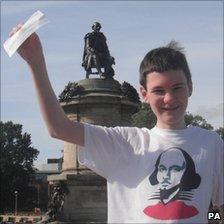Maths prodigy, 15, makes Cambridge history
- Published

Arran plans to develop his interest in English literature at Cambridge
A 15-year-old mathematics prodigy is set to become the youngest undergraduate at the University of Cambridge for more than two centuries.
Arran Fernandez, who was home-educated in Surrey, will start studying at the university next month.
The teenager has taken a place at Fitzwilliam College to become the youngest Cambridge student since 1773.
Arran, who was tutored by his father Dr Neil Fernandez, 45, will be 15 and three months when he starts lectures.
Cambridge has not accepted anyone his age since the 14-year-old William Pitt the Younger was offered a place in 1773.
Arran said: "I'm excited about starting the course and advancing my knowledge of maths.
"It isn't the youngest bit that is so important to me - I'm more interested in actually going to Cambridge than comparing myself with other people who go there."
The youngster will live in rented accommodation with his father and has admitted that he will miss his mother Hilde Fernandez, 48, who will remain at the family home.
He plans to develop his interest in English literature and join a bird watching society while he is at university.
Cambridge senior tutor Dr Paul Chirico said: "Fitzwilliam College is pleased to confirm that Arran Fernandez has achieved the conditions of his offer to read Mathematics at the University of Cambridge.
"Fitzwilliam considers all applications to the College very carefully, regardless of background. Arran was assessed as part of this well-established process, and his considerable academic potential was recognised."
Riemann hypothesis
The degree, or tripos as it is known to Cambridge students, is widely regarded as one of the most difficult in the world.
Former scholars include Isaac Newton and Stephen Hawking.
Arran first made headlines in 2001 when, at five years old, he gained the highest grade possible in the foundation maths paper.
He went on to sit the intermediate GCSE paper the following summer and gained A* in the advanced level paper in 2003.
Arran has said he would like to solve the Riemann hypothesis - a theory about the patterns of prime numbers which has baffled the greatest mathematicians for 150 years.
- Published24 August 2010
- Published19 August 2010